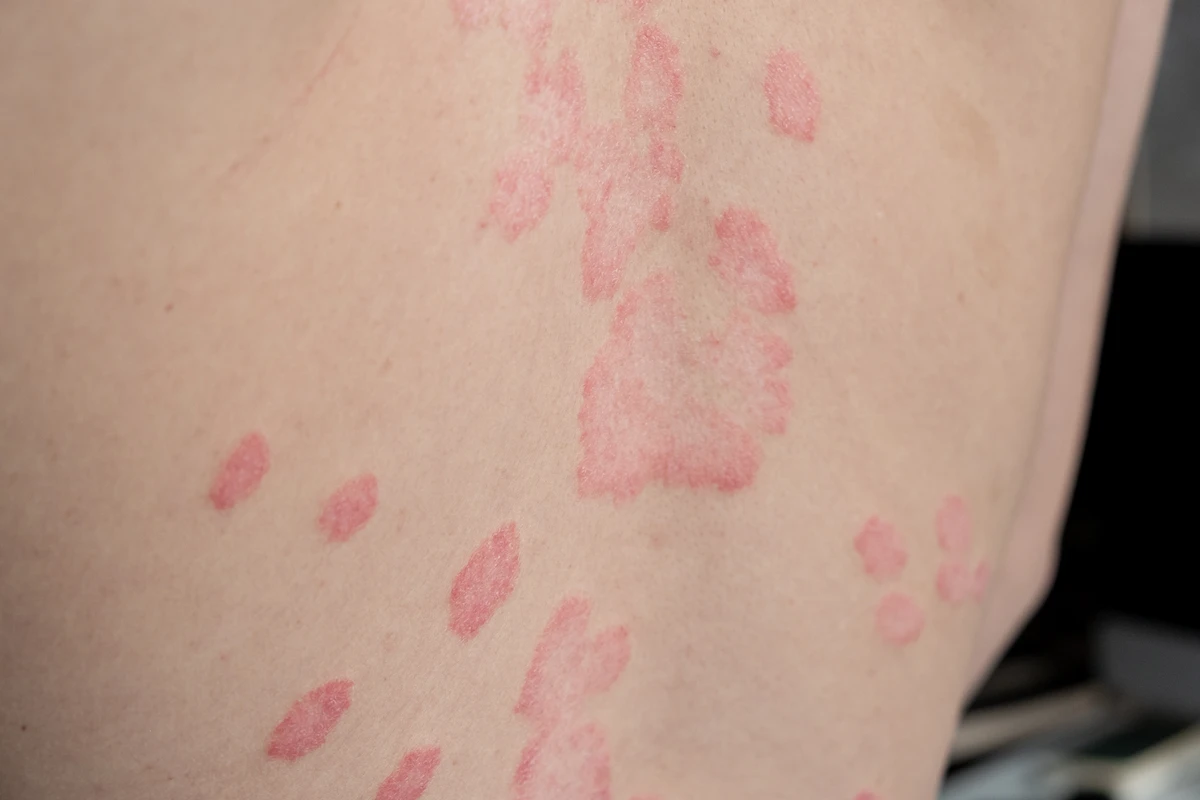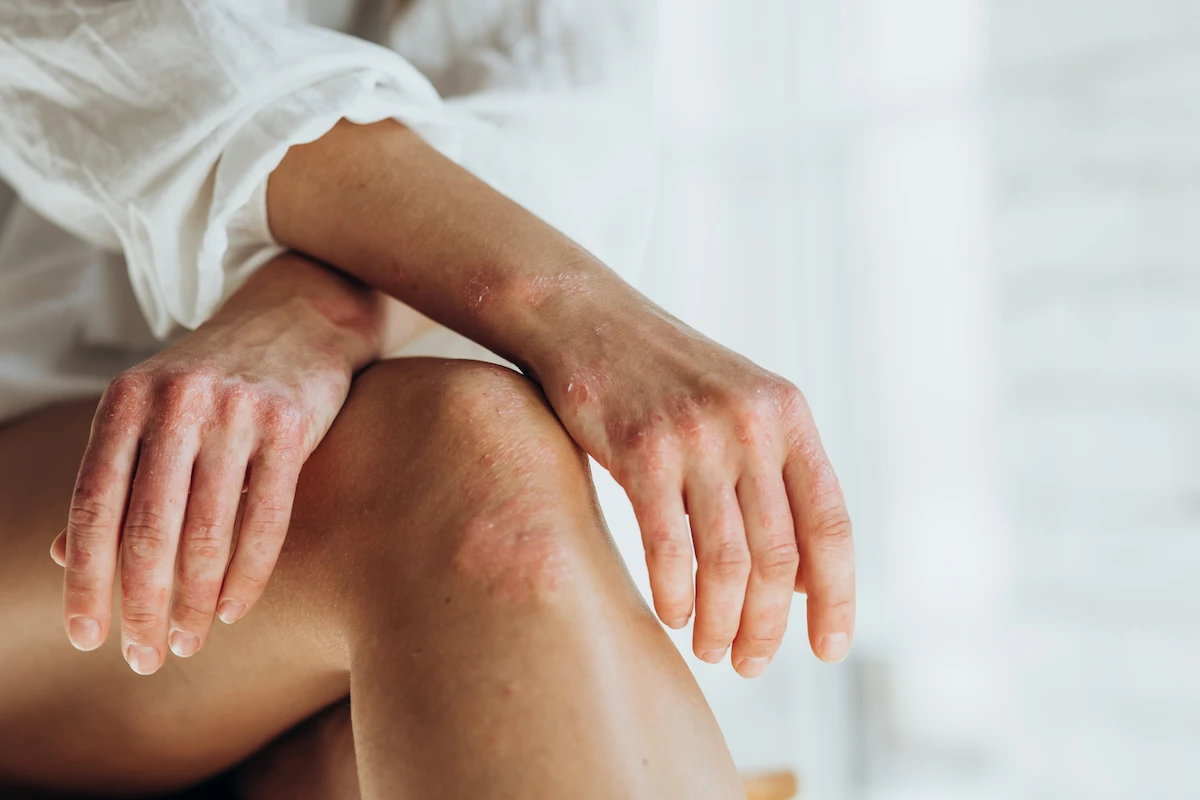Psoriasis Symptoms: Understanding the Skin Condition

Skin conditions can be frustrating and often impact self-esteem. If you’re experiencing red, itchy, or scaly patches on your skin, you might be wondering if it’s psoriasis or eczema. These two conditions share some similarities but have distinct characteristics.
This article delves into the world of psoriasis, exploring its symptoms, causes, and treatment options. We’ll also discuss the difference between psoriasis and eczema and guide you on how to seek professional medical advice in Miami.
What is Psoriasis?
Psoriasis is a chronic autoimmune disease that causes skin cells to grow too quickly. Normally, skin cells regenerate every 28-30 days, but in psoriasis, this process happens every 3-7 days. This rapid turnover leads to a buildup of thick, scaly patches on the skin’s surface.
Psoriasis Symptoms: Recognizing the Signs
Psoriasis symptoms can vary from person to person and range from mild to severe. Common signs include:
- Red, scaly patches on the skin: These patches can appear anywhere on the body, but common locations include the scalp, elbows, knees, and lower back.
- Itching and burning: The affected skin can be intensely itchy and sometimes painful.
- Thickened nails: Psoriasis can also affect the nails, causing them to thicken, pit, or crumble.
- Joint pain and stiffness: Some people with psoriasis develop psoriatic arthritis, which causes joint inflammation and pain.
Psoriasis vs. Eczema: Key Differences
While both conditions involve skin inflammation and itching, there are key distinctions:
- Appearance: Psoriasis typically causes thicker, silvery-white scales on top of red patches, while eczema often presents as dry, red, and itchy patches.
- Causes: Psoriasis is an autoimmune disease, while eczema is often related to allergies or environmental triggers.
- Location: Psoriasis commonly affects the scalp, elbows, knees, and lower back, while eczema often appears in the creases of the elbows, knees, and neck.

Eczema Psoriasis: A Common Misconception
The terms “eczema” and “psoriasis” are sometimes used interchangeably, but they are distinct conditions. If you’re unsure about your diagnosis, consult a dermatologist.
Is Psoriasis an Autoimmune Disease?
Yes, psoriasis is an autoimmune disease. This means your immune system mistakenly attacks your body’s own healthy tissues, in this case, your skin cells, leading to inflammation and the characteristic symptoms of psoriasis.
What is Plaque Psoriasis?
Plaque psoriasis is the most common type of psoriasis, accounting for about 80% of cases. It’s characterized by thick, red patches covered with silvery-white scales.
How to Cure Psoriasis Permanently: Managing a Chronic Condition
Currently, there’s no cure for psoriasis. However, various treatments can help manage symptoms, reduce inflammation, and improve your quality of life.
Psoriasis Treatment: A Multifaceted Approach
Psoriasis treatment often involves a combination of:
- Topical medications: Creams and ointments applied to the skin to reduce inflammation and scaling.
- Light therapy: Exposure to ultraviolet (UV) light to slow skin cell growth.
- Oral or injectable medications: Systemic medications to suppress the immune system and reduce inflammation.
- Lifestyle changes: Stress management, healthy diet, and avoiding triggers can help manage symptoms.
Primary Care Doctor and Psoriasis: Seeking Guidance in Miami
If you’re experiencing symptoms of psoriasis, consult a primary care doctor or a dermatologist in Miami. They can:
- Evaluate your symptoms and medical history.
- Perform a physical exam to assess your skin.
- Recommend appropriate treatment options or refer you to a specialist.
Key Takeaways:
- Psoriasis is a chronic autoimmune disease that causes thick, scaly patches on the skin.
- It’s important to distinguish psoriasis from eczema, as they have different causes and treatments.
- While there’s no cure for psoriasis, various treatments can help manage symptoms.
- If you experience symptoms of psoriasis, consult a primary care doctor in Miami for diagnosis and guidance.
Remember, this article is intended for informational purposes only and should not be considered a substitute for professional medical advice. If you have any concerns about your health or are experiencing skin problems, consult a qualified healthcare professional.
FAQs: Psoriasis Symptoms
- Is psoriasis contagious?
No, psoriasis is not contagious. It’s an autoimmune disease, meaning it’s caused by your immune system attacking your own body’s tissues, not by an external infection. - What are some common triggers for psoriasis flare-ups?
Triggers vary from person to person, but common ones include stress, skin injuries (cuts or scrapes), infections, certain medications, and even weather changes. - Can psoriasis affect my joints?
Yes, some people with psoriasis develop psoriatic arthritis, a condition that causes inflammation and pain in the joints. If you experience joint pain along with your skin symptoms, consult your doctor in Miami. - What are some home remedies for psoriasis?
While it’s essential to follow your doctor’s treatment recommendations, some home remedies might help soothe psoriasis symptoms. These include:- Moisturizing regularly with thick creams or ointments
- Taking lukewarm baths with colloidal oatmeal or Epsom salts
- Getting some sunlight exposure (but avoid sunburn)
- Managing stress through relaxation techniques
- I’m experiencing skin changes, but I’m not sure if it’s psoriasis or eczema. How can I find out? A primary care doctor or a dermatologist in Miami can examine your skin and determine the cause of your symptoms. They can also recommend appropriate treatment options based on your specific condition.
Contact Us
Hiriart & Lopez MD, LLC
9950 SW 107th Ave STE 101,
Miami, FL 33176
305-274-8779
Phone: (305) 274-8779
Fax: (305) 274-0646
OPENING HOURS
Monday 7:30 AM–4:30 PM
Tuesday 7:30 AM–4:30 PM
Wednesday 7:30 AM–4:30 PM
Thursday 7:30 AM–4:30 PM
Friday 7:30–11 AM
Saturday Closed
Sunday Closed
OFFICE LOCATION
Psoriasis Symptoms: Understanding the Skin Condition

Skin conditions can be frustrating and often impact self-esteem. If you’re experiencing red, itchy, or scaly patches on your skin, you might be wondering if it’s psoriasis or eczema. These two conditions share some similarities but have distinct characteristics.
This article delves into the world of psoriasis, exploring its symptoms, causes, and treatment options. We’ll also discuss the difference between psoriasis and eczema and guide you on how to seek professional medical advice in Miami.
What is Psoriasis?
Psoriasis is a chronic autoimmune disease that causes skin cells to grow too quickly. Normally, skin cells regenerate every 28-30 days, but in psoriasis, this process happens every 3-7 days. This rapid turnover leads to a buildup of thick, scaly patches on the skin’s surface.
Psoriasis Symptoms: Recognizing the Signs
Psoriasis symptoms can vary from person to person and range from mild to severe. Common signs include:
- Red, scaly patches on the skin: These patches can appear anywhere on the body, but common locations include the scalp, elbows, knees, and lower back.
- Itching and burning: The affected skin can be intensely itchy and sometimes painful.
- Thickened nails: Psoriasis can also affect the nails, causing them to thicken, pit, or crumble.
- Joint pain and stiffness: Some people with psoriasis develop psoriatic arthritis, which causes joint inflammation and pain.
Psoriasis vs. Eczema: Key Differences
While both conditions involve skin inflammation and itching, there are key distinctions:
- Appearance: Psoriasis typically causes thicker, silvery-white scales on top of red patches, while eczema often presents as dry, red, and itchy patches.
- Causes: Psoriasis is an autoimmune disease, while eczema is often related to allergies or environmental triggers.
- Location: Psoriasis commonly affects the scalp, elbows, knees, and lower back, while eczema often appears in the creases of the elbows, knees, and neck.

Eczema Psoriasis: A Common Misconception
The terms “eczema” and “psoriasis” are sometimes used interchangeably, but they are distinct conditions. If you’re unsure about your diagnosis, consult a dermatologist.
Is Psoriasis an Autoimmune Disease?
Yes, psoriasis is an autoimmune disease. This means your immune system mistakenly attacks your body’s own healthy tissues, in this case, your skin cells, leading to inflammation and the characteristic symptoms of psoriasis.
What is Plaque Psoriasis?
Plaque psoriasis is the most common type of psoriasis, accounting for about 80% of cases. It’s characterized by thick, red patches covered with silvery-white scales.
How to Cure Psoriasis Permanently: Managing a Chronic Condition
Currently, there’s no cure for psoriasis. However, various treatments can help manage symptoms, reduce inflammation, and improve your quality of life.
Psoriasis Treatment: A Multifaceted Approach
Psoriasis treatment often involves a combination of:
- Topical medications: Creams and ointments applied to the skin to reduce inflammation and scaling.
- Light therapy: Exposure to ultraviolet (UV) light to slow skin cell growth.
- Oral or injectable medications: Systemic medications to suppress the immune system and reduce inflammation.
- Lifestyle changes: Stress management, healthy diet, and avoiding triggers can help manage symptoms.
Primary Care Doctor and Psoriasis: Seeking Guidance in Miami
If you’re experiencing symptoms of psoriasis, consult a primary care doctor or a dermatologist in Miami. They can:
- Evaluate your symptoms and medical history.
- Perform a physical exam to assess your skin.
- Recommend appropriate treatment options or refer you to a specialist.
Key Takeaways:
- Psoriasis is a chronic autoimmune disease that causes thick, scaly patches on the skin.
- It’s important to distinguish psoriasis from eczema, as they have different causes and treatments.
- While there’s no cure for psoriasis, various treatments can help manage symptoms.
- If you experience symptoms of psoriasis, consult a primary care doctor in Miami for diagnosis and guidance.
Remember, this article is intended for informational purposes only and should not be considered a substitute for professional medical advice. If you have any concerns about your health or are experiencing skin problems, consult a qualified healthcare professional.
FAQs: Psoriasis Symptoms
- Is psoriasis contagious?
No, psoriasis is not contagious. It’s an autoimmune disease, meaning it’s caused by your immune system attacking your own body’s tissues, not by an external infection. - What are some common triggers for psoriasis flare-ups?
Triggers vary from person to person, but common ones include stress, skin injuries (cuts or scrapes), infections, certain medications, and even weather changes. - Can psoriasis affect my joints?
Yes, some people with psoriasis develop psoriatic arthritis, a condition that causes inflammation and pain in the joints. If you experience joint pain along with your skin symptoms, consult your doctor in Miami. - What are some home remedies for psoriasis?
While it’s essential to follow your doctor’s treatment recommendations, some home remedies might help soothe psoriasis symptoms. These include:- Moisturizing regularly with thick creams or ointments
- Taking lukewarm baths with colloidal oatmeal or Epsom salts
- Getting some sunlight exposure (but avoid sunburn)
- Managing stress through relaxation techniques
- I’m experiencing skin changes, but I’m not sure if it’s psoriasis or eczema. How can I find out? A primary care doctor or a dermatologist in Miami can examine your skin and determine the cause of your symptoms. They can also recommend appropriate treatment options based on your specific condition.
Contact Us
Hiriart & Lopez MD, LLC
9950 SW 107th Ave STE 101,
Miami, FL 33176
305-274-8779
Phone: (305) 274-8779
Fax: (305) 274-0646
OPENING HOURS
Monday 7:30 AM–4:30 PM
Tuesday 7:30 AM–4:30 PM
Wednesday 7:30 AM–4:30 PM
Thursday 7:30 AM–4:30 PM
Friday 7:30–11 AM
Saturday Closed
Sunday Closed

